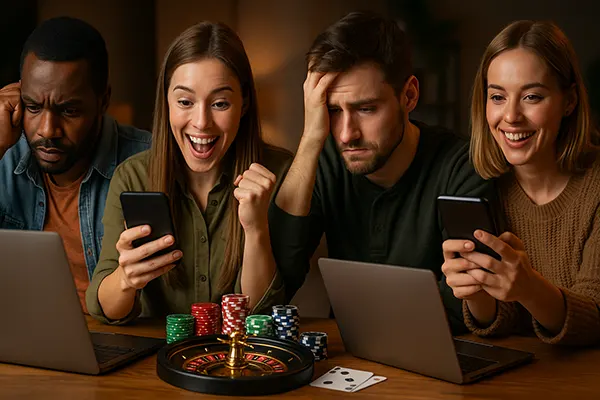
Real Stories of Players: How Online Casinos Changed Lives
Online gambling has become a common part of entertainment for millions worldwide. However, behind every bet, there’s a personal story—sometimes filled with triumph, sometimes with regret. In this article, we’ll explore real-life experiences of players who have encountered the full spectrum of what online casinos can bring—both joy and hardship.
Winning Moments: Stories of Fortune and Opportunity
For some, the experience with online gambling turned into an unexpected stroke of luck. These stories, while rare, showcase how a sudden win can significantly impact a person’s life. James, a 32-year-old graphic designer from Manchester, shared how a £2 spin on a progressive jackpot slot turned into a £178,000 win. “It was surreal. I paid off my mortgage, gave some to my parents, and put the rest away. I haven’t played since,” he admitted.
Another story comes from Sofia in Italy, who used her €45,000 win to start a small café in her hometown. “It was a dream I kept postponing for years. The win gave me the final push,” she explained. Her case is an example of how players sometimes use gambling gains as seed capital for real-life goals.
Meanwhile, 27-year-old Norbert from Poland used his €12,000 winnings to finish his university degree. “I don’t recommend gambling as a plan,” he said. “But in my case, it helped me during a time of desperation.”
The Thin Line Between Luck and Planning
Despite their good fortune, these players stress that luck is just that—luck. None of them were habitual gamblers, and each emphasised moderation. They also pointed out that big wins do not equate to financial literacy. “Without a plan, it’s easy to waste it all,” said James. Many who come into large sums suddenly struggle to manage the funds wisely.
It’s important to note that in all three cases, players walked away after their success. Their ability to stop playing highlights one of the most crucial factors in gambling: self-control. These individuals knew when to quit, a trait not everyone possesses when luck turns in their favour.
Responsible use of winnings also mattered. All interviewees used their funds for constructive purposes—education, family support, or entrepreneurship—rather than falling into further gambling. These are rare examples of positive outcomes shaped by smart choices post-win.
Losses and Consequences: The Other Side of the Coin
Not all stories have a happy ending. Mike from Dublin, a 38-year-old former delivery driver, found himself over £20,000 in debt after years of compulsive gambling. “It started as fun during the lockdown, but it turned into a coping mechanism,” he confessed. His relationship ended, and he lost his home. Mike is now in recovery and has not gambled for two years.
Elena from Bulgaria experienced a different type of damage—emotional. “I never lost thousands,” she said, “but I lost trust. I used to hide the habit from my husband, and that secrecy damaged our marriage.” Elena now attends weekly group therapy sessions and speaks publicly about addiction recovery.
Then there’s the case of Niko from Finland. At just 24, he was borrowing from friends, skipping rent payments, and eventually got caught in online loan spirals. “I always thought the next bet would save me. That it would fix everything,” he shared. His family helped him enter a rehabilitation programme, and he now works at a call centre and lives debt-free—but cautious.
The Cost of Secrecy and Denial
Across all negative stories, two themes repeat: secrecy and denial. Many players hide the scale of their activity until it’s too late. That silence enables addiction to grow unchecked. “I lied to myself first,” said Mike. “That was the real danger.”
Support from family and professionals proved essential in each recovery. Whether it was therapy, financial counselling, or digital tools to block gambling access, recovery required action and accountability. The journey is not quick, but the first step—admitting the problem—is universal across every story shared.
Moreover, the negative cases show that loss isn’t always monetary. Trust, stability, and health can all suffer. The emotional consequences often linger far longer than the financial ones, especially when relationships are involved.

Advice from Those Who’ve Been There
All participants, regardless of outcome, had valuable advice. One recurring point was to set strict time and money limits and never chase losses. “If you’re playing to fix something in life, stop,” said Elena. “It won’t solve it—it’ll magnify it.”
Many recommended using gambling-blocking software, setting up bank limits, or avoiding bonuses that create a false sense of ‘free’ play. These practical tools help build friction between the player and impulsive decisions. Norbert also advised staying away from games with quick cycles like slots. “They are addictive by design,” he warned.
The most powerful advice came from a place of lived experience. “Talk to someone,” said Mike. “Even one person knowing can change everything. Isolation feeds the problem. Connection starts the cure.”
Can There Be Balance?
While many argue that any form of gambling is dangerous, others believe in a balanced, cautious approach. “It’s a form of entertainment,” said Sofia, “but it must never be the main source of excitement or hope.” The key, they suggest, is knowing your why—and stopping the moment that reason becomes emotional escape.
Regular self-assessment and openness with others are tools that helped many in our interviews stay in control. They stress that if gambling stops being fun, it’s time to walk away. Most gambling issues arise when users are isolated or emotionally vulnerable.
Ultimately, the power lies with the individual. But that power must be informed by experience, boundaries, and the support of others. Real stories remind us that the outcome of online gambling depends not just on luck—but on choices made before and after every click.
